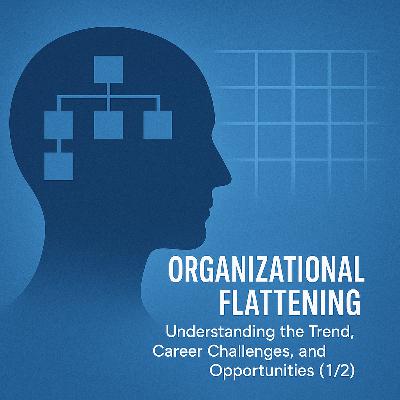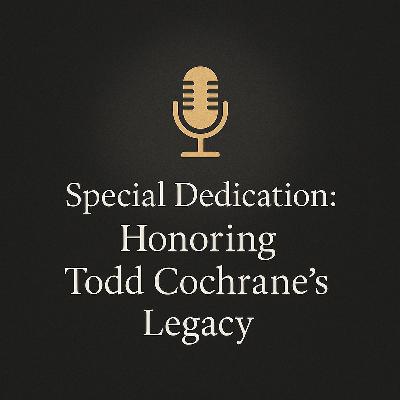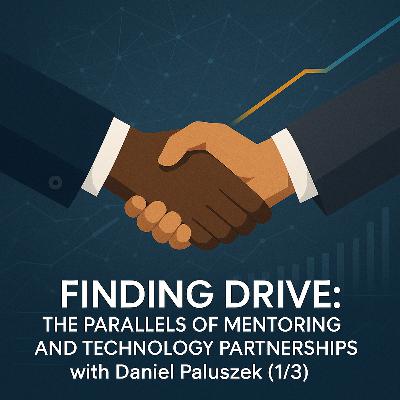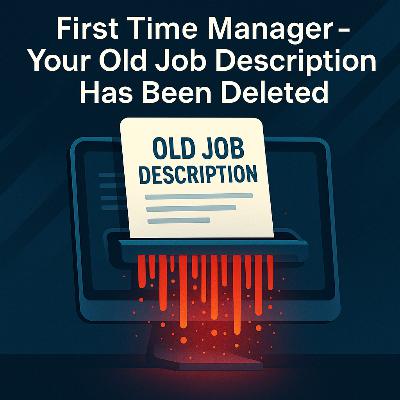Stay Calm and Don’t Panic: Translating Military Leadership Lessons to the Corporate World with Paul Nadeau (1/2)
Description
Imagine transitioning from individual contributor at a company to managing an organization of 155 people. That’s quite the promotion. How would you approach that kind of change?
Before you get too anxious about what’s coming, Paul Nadeau, our guest this week in episode 344, has two pieces of advice: stay calm, and don’t panic.
Paul’s career began as a Radioman in the Navy where he focused on telecommunications, but he later pursued law enforcement. You’ll hear firsthand about the experiences that cemented this mantra of remaining calm in Paul’s mind and follow him through leadership training in the Navy. Listen in to hear how a specific mix of classroom instruction and practical experience forged a leadership philosophy that is widely applicable both in the military and in the corporate world.
Whether you are an individual contributor or a people leader today, you’ll learn how to identify the traits of natural leaders and understand some of the real challenges of stepping into a management role.
Original Recording Date: 08-28-2025
Topics – Meet Paul Nadeau, Birth of a Specialty, The Importance of Staying Calm, Leadership Training and Gaining Experience, Assessing Leadership Talent
2:28 – Meet Paul Nadeau
- Paul Nadeau is a Solutions Consultant at Palo Alto Networks.
- Paul’s early career began with joining the Navy, but his decision to join starts even earlier.
- Paul grew up in the Texas Hill Country (areas around Fredericksburg and Kerrville) and attended a private school for most of his young life.
- Though the academics were great at private school, Paul talked his father into letting him attend public school for his junior year of high school.
- At the public high school, Paul started to get into trouble. At one point his father had a very frank conversation with him.
- “You need to do something with your life.” – advice from Paul Nadeau’s father
- Paul’s father was a Marine who served in World War II and was awarded a Purple Heart for his service. He suggested Paul consider joining the military. Paul’s father wanted him to have some type of trade to fall back on after military service.
- While the Air Force did seem appealing, Paul ended up joining the Navy in 1988. After boot camp, Paul was sent to all kinds of schools before serving on the USS America in Norfolk, Virginia in 1989.
- Paul was serving when Desert Storm broke out in 1990.
- After serving in the Navy, Paul decided to go into law enforcement (something he had always wanted to do). Though his work in the Navy focused on telecommunications / satellite communications, Paul didn’t want to keep doing it after serving in the Navy. He chose to attend the police academy instead.
- Though Paul enjoyed being a police officer, the pay did not support starting a family.
- Paul re-enlisted in the Navy in 1995 to once again focus on telecommunications, trading some of the re-enlistment bonus money to use for school.
- Paul says he did Cisco training, Novell training, Unix administration, and even Windows administration training. He and co-workers were pioneering running these systems across satellite links (from ship to shore).
- When Paul went into the Navy, they were looking for people who had clean backgrounds. He was able to obtain a security clearance after joining.
7:07 – Birth of a Specialty
- How did Paul end up in telecommunications after joining the Navy?
- At age 17 when he first enlisted in the Navy, Paul wanted to do something in the medical field. He was told no.
- Paul’s second choice for occupation was to be a cop. At the time, you had to have at least 4 years of service to do this.
- The there was an opening for a job (or ratings as they are called) called Radioman focused on telecommunications. Though the nuclear program was an option at the time, Paul wanted nothing to do with it.
- “Whenever we say option, it was pretty much like, ‘this is what you’re going to do. We’re going to send you over here, and you’re going to learn this….’ That’s what got me into telecommunications as a whole and into networking. Yeah, it was a good step.” – Paul Nadeau
- The job placements were generally based on ASVAB scores, and it was Paul’s high scores that presented the opportunities for different fields.
- Maybe we should have a military recruiter on the show at some point to better understand how this process works?
- What drew Paul to law enforcement after getting exposure to telecommunications in the Navy?
- When Paul was a kid (even as young as kindergarten), his dad (a disabled veteran) would walk him to school each day. Every day he would ask Paul what he wanted to do when he grew up. Paul always said he wanted to be a cop.
- Paul isn’t 100% sure why he wanted to be a cop from such a young age, but there was a state trooper who lived in the same neighborhood. Paul loved his car and thought he was one of the nicest guys in the world.
- Six-year-old Paul wanted a career in law enforcement.
- When Paul was a kid (even as young as kindergarten), his dad (a disabled veteran) would walk him to school each day. Every day he would ask Paul what he wanted to do when he grew up. Paul always said he wanted to be a cop.
- John asks about access to schools in the military. The training seems relevant to a field even for the person who has not yet worked in that field.
- Paul says his training for Cisco and Novell, for example, was delivered by a civilian instructor who visited the Naval base. It was civilian training paid for and sponsored by the Navy.
- After Desert Storm while still stationed in Norfolk, Paul wanted to attend Old Dominion University.
- He remembers having to attend in uniform, but the cost of attending was covered by the Navy. Paul wanted to take advantage of the opportunity to get more education.
- There was also a Radioman “A” school Paul attended and some “Sea” schools. He learned satellite communication and cryptology, for example. The training courses for Cisco and Novell were mixed into the same curriculum as these Naval schools.
- The schools you were eligible to attend were based on your job. Paul tells us the Radioman rating from years ago has changed to IT (according to Naval classification / rating).
- He remembers studying morse code and HF (high frequency) communications (ship-to-ship, ship-to-shore, communication over satellite, etc.).
- Radio was considered a secure space, and the personnel focused in these areas got exposed to all of the new technologies. Paul liked being able to tinker with it.
- In addition to attending school, working on a ship 7 days per week is on-the-job training. Paul worked 7 days per week for 7 months during Desert Storm.
14:34 – The Importance of Staying Calm
- How did military training translate to intense / hostile situations in law enforcement?
- Paul was assigned to an AMCC (American Mobile Communications Center) unit for Desert Storm, and as a result he went through a lot of training (hand-to-hand combat, logistics training, and other things one might use when forward deployed).
- “The number one thing that you actually learn, believe it or not, is the key to success – stay calm. Don’t panic…. Panic is the number one thing that will get you in trouble every time…. It’s kind of been the guiding light in life…that one little bit of information.” – Paul Nadeau
- Paul is a private pilot and understands the importance of staying calm while he is in the cockpit of a plane. This translates to so many areas of life (interactions with kids, situations at work, etc.).
- Did Paul do anything specific to help himself stay calm? What would he tell people who are not good at this?
- Listen to Paul’s story of being a field training officer during his time in law enforcement.
- The instinct to stay calm sort of came naturally to him.
- When situations begin to escalate, take a second to think about them rationally. It won’t do us any good to let our mind run away with a situation and have it take control of us.
- Many people consistently fight anxiety. Paul has been fortunate enough not to struggle with it.
- Was what Paul describes (staying calm even in difficult situations) a result of basic training and becoming a little bit desensitized?
- Paul tells the story of basic training and getting exposed to tear gas.
- “You can panic and pass out because you will. You will stop breathing and just hit the ground. Or you can stay calm and regulate your breathing and kind of center yourself. And when you do, you can…overcome the problem or issue. That was my initial wow. This is a really good thing for life in general…. Whenever you make it out, yeah, you’re coughing. You’re hacking. Your eyes are burning…. But you were still able to actually perform. You were actually able to breathe. You were actually able to say a sentence…. They want you to have that levity to do that….” – Paul Nadeau, on staying calm in basic training
- Paul describes a similar type of training for firefighters. You’re in a giant room of 2-3-foot deep water, and someone dumps gasoline on the water to start a fire with it. Then it’s the firefighter’s job to put out the fire.
- Despite instructors demonstrating how to put out the fire, people will panic when put in the situation.
- Some of this may go back to the training Paul received on how to perform under
























